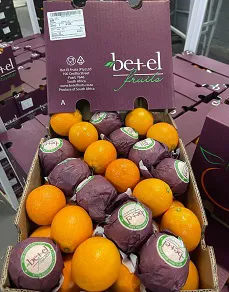 Bet-el Fruits is still harvesting the last Midknight and Delta Valencias from Citrusdal in the Western Cape.
Bet-el Fruits is still harvesting the last Midknight and Delta Valencias from Citrusdal in the Western Cape.
“The fruit is very small, which is related to the flowering period last year when there was quite a bit of cold and some of our producers had water shortages which impacted the fruit counts and fruit sizes," says Francois Myburgh, marketing executive at Bet-el Fruits.
He continues: "Most of the fruit fall into the small counts at the moment which is perhaps just as well, as most of the markets that take large amounts have ended. Europe’s duty deadline kicks in on 15 October so our last shipment went out last week. China’s own fruits are starting to come on so those markets are coming under pressure. The last conventional vessel for the USA has been loaded, so most of the markets where we sent the larger fruits have closed so for us the small fruit isn’t really much of a drawback although it’s always nice to have a balanced spread."
This late in the season, fruit for Europe, America and for China all spill over into the Middle Eastern market and consequently, he says, he expects the Middle East orange market to come under immense pressure.
“The other market for late Valencias will be Bangladesh, Malaysia and the Indian Ocean islands like Mauritius and Réunion but these small markets are limited in the amount they can take, so that won’t really relieve the pressure. Bangladesh can take a fair volume but port strikes in Chittagong make us hesitant to pursue this avenue.”
US soft citrus market under pressure due to oversupply
“The USA orange market was very stable but we realized that soft citrus came under pressure - there is simply too much soft citrus from South Africa and fruit from Peru in the USA put us under pressure. It was only high value and licensed varieties that did well but the lower value soft citrus like clementines came under a lot of pressure.”
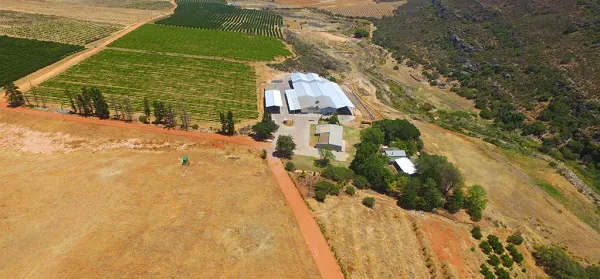 Silwerpak packhouse in Citrusdal, Western Cape (photos supplied by Bet-el Fruits)
Silwerpak packhouse in Citrusdal, Western Cape (photos supplied by Bet-el Fruits)
The soft citrus was incredibly small, he says, and standards controlling the counts of fruit exported will have to be introduced, he believes.
The start of the lemon campaign went well, becoming more difficult towards the middle of the season. The damage that Argentina had suffered to their lemon crop due to cold and drought opened up some space for South Africa and the market improved considerably.
However, now, right at the end of the lemon season the market just is not there, Francois says.
Shipping: same problems at higher prices
“Everyone will tell you: shipping has been an absolute nightmare,” Francois says. “What unfortunately happened is that the prices were also pushed up so on some of our Far Eastern routes the cost for a container almost increased by 30%. So, you reason: ok, it is more expensive but at least you’ll have container space or you’ll have containers - but even then, that’s not always the case. They pushed up the prices but the problem remains, so now you have the same problems and you’re paying more.”
The container shortage, especially for trade to the Far East, started last year during the grape harvest.
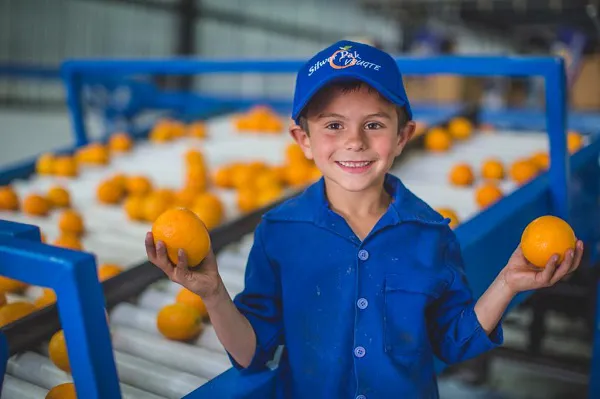
Logistics during the grape season is a concern
Flowering in the vineyards point to a large grape crop at hand, starting in November. The grape industry has shown steady growth of 4% to 5% over the past 5 years.
“That means more cartons in the system that will have to be handled. With the shipping delays we’ve been fortunate with citrus because citrus has a storage ability but grapes and stone fruit just don’t have that luxury.”
He’s very concerned about the logistics of the upcoming grape season. Increased container costs can work out to R8 to R10 more per 4.5kg equivalent carton “and you’re not going to make up that difference in the market,” he points out. “Usually, it’s the fruit that ends up paying for the difference.”
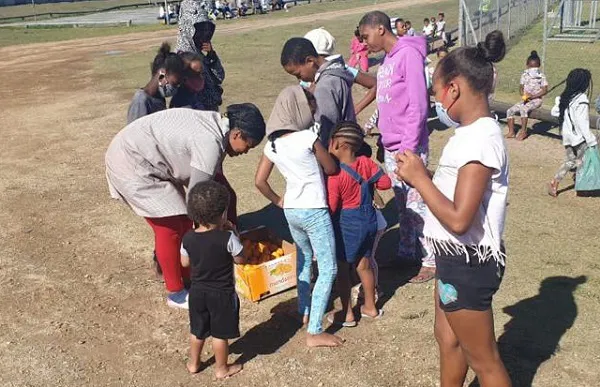 Bet-el Fruits donated 10,000 mandarins to the community of Bredasdorp at six distribution points where children received first preference
Bet-el Fruits donated 10,000 mandarins to the community of Bredasdorp at six distribution points where children received first preference
Costs and price are coming ever closer to each other and producers are increasingly dependent on the exchange rate, or crop failure among their competitors, to make a profit.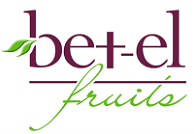 For more information:
For more information:
Francois Myburgh
Bet-el Fruits
Tel: +27 21 863 3146
Email: [email protected]
https://www.betelfruits.com/
